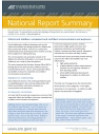Good quality early childhood education and care for infants and toddlers has lasting benefits for children and their parents and whānau. This time is a critical and fundamental period of development for children as it lays the foundations for lifelong learning. The communication and exploration strands of Te Whāriki, the Ministry of Education’s curriculum for early childhood, are crucial to these foundations.
The number of infants and toddlers participating in early childhood education (ECE) has considerably increased. In 2000, 49,322 children up to two years of age were enrolled in early childhood services. This had increased by 53 percent to 75,514 in 2013.
This report presents ERO’s findings about how well 235 early childhood services reviewed during Terms 1 and 2, 2014 supported infants and toddlers to become competent and confident communicators and explorers. We were interested in finding out what was happening in early childhood services where infants and toddlers were well supported as communicators and explorers. We also wanted to know about the challenges or barriers for services that were not as successful in supporting infants’ and toddlers’ learning and development.
ERO used Te Whāriki's definition of infants as children aged from birth to 18 months, and toddlers as children aged from one to three years. Te Whāriki positions infants and toddlers as learners with individual preferences, needs and desires:
Infants, toddlers and young children have distinctive and different needs and characteristics. These will determine the focus of the curriculum as it applies for each learner.

